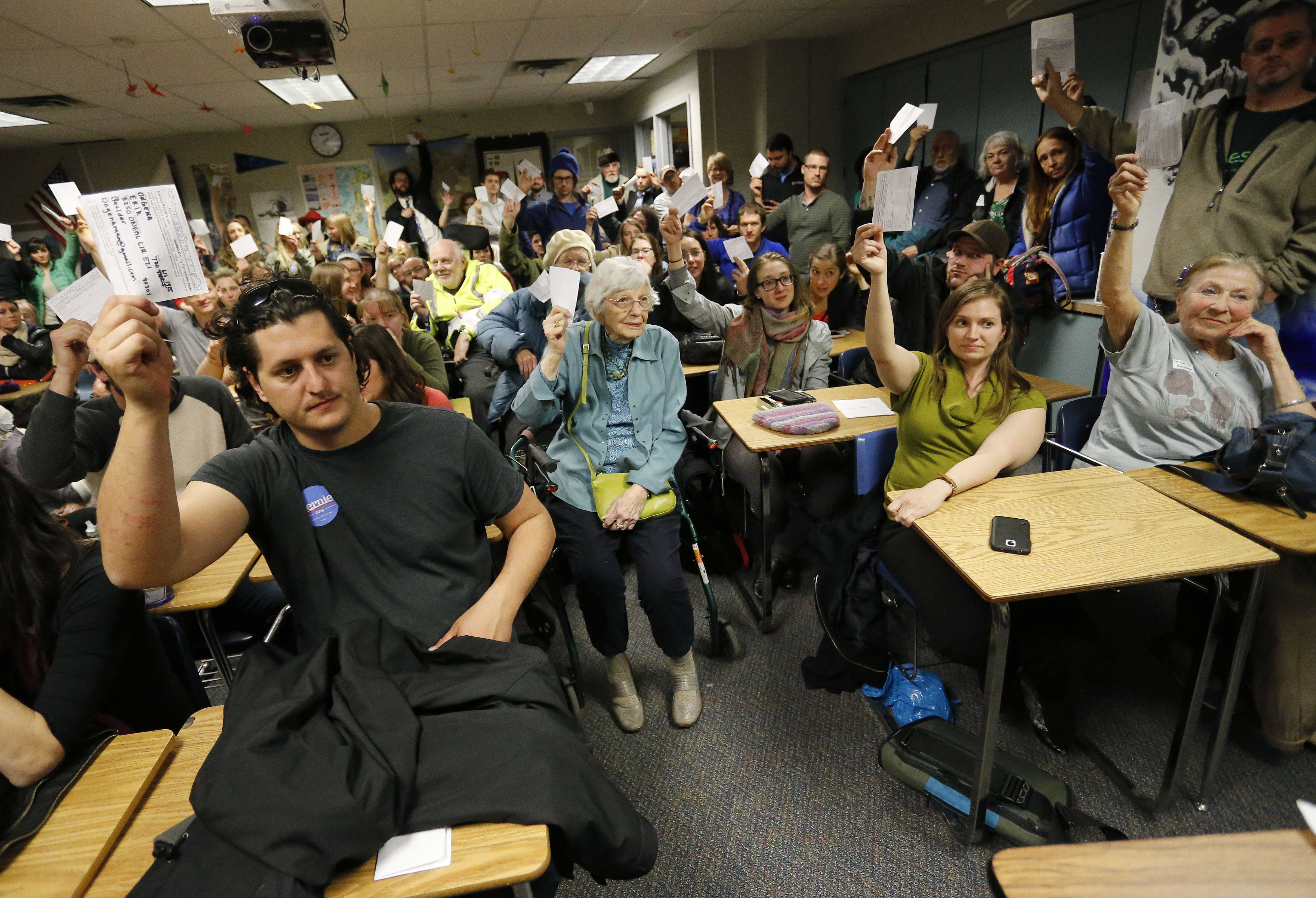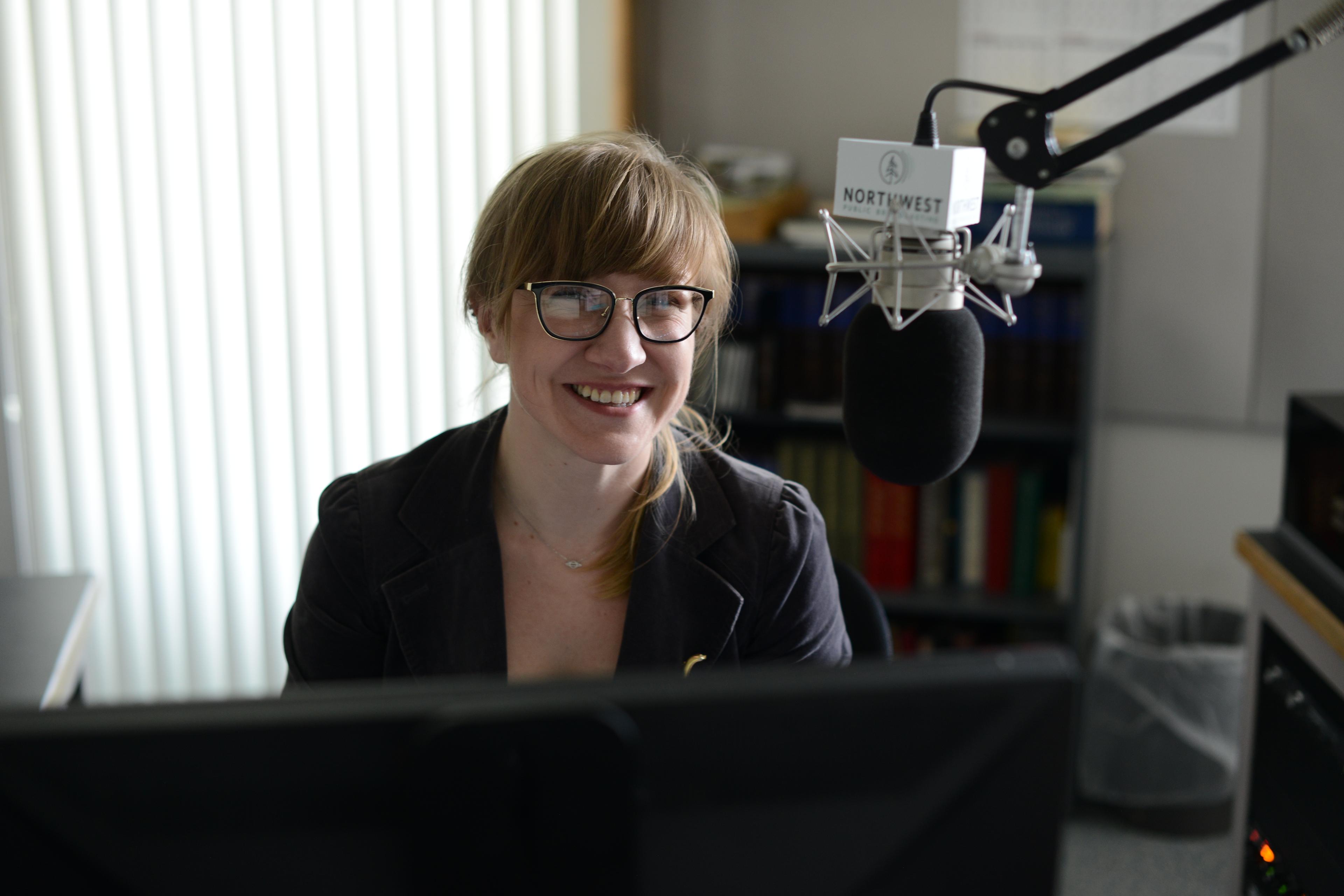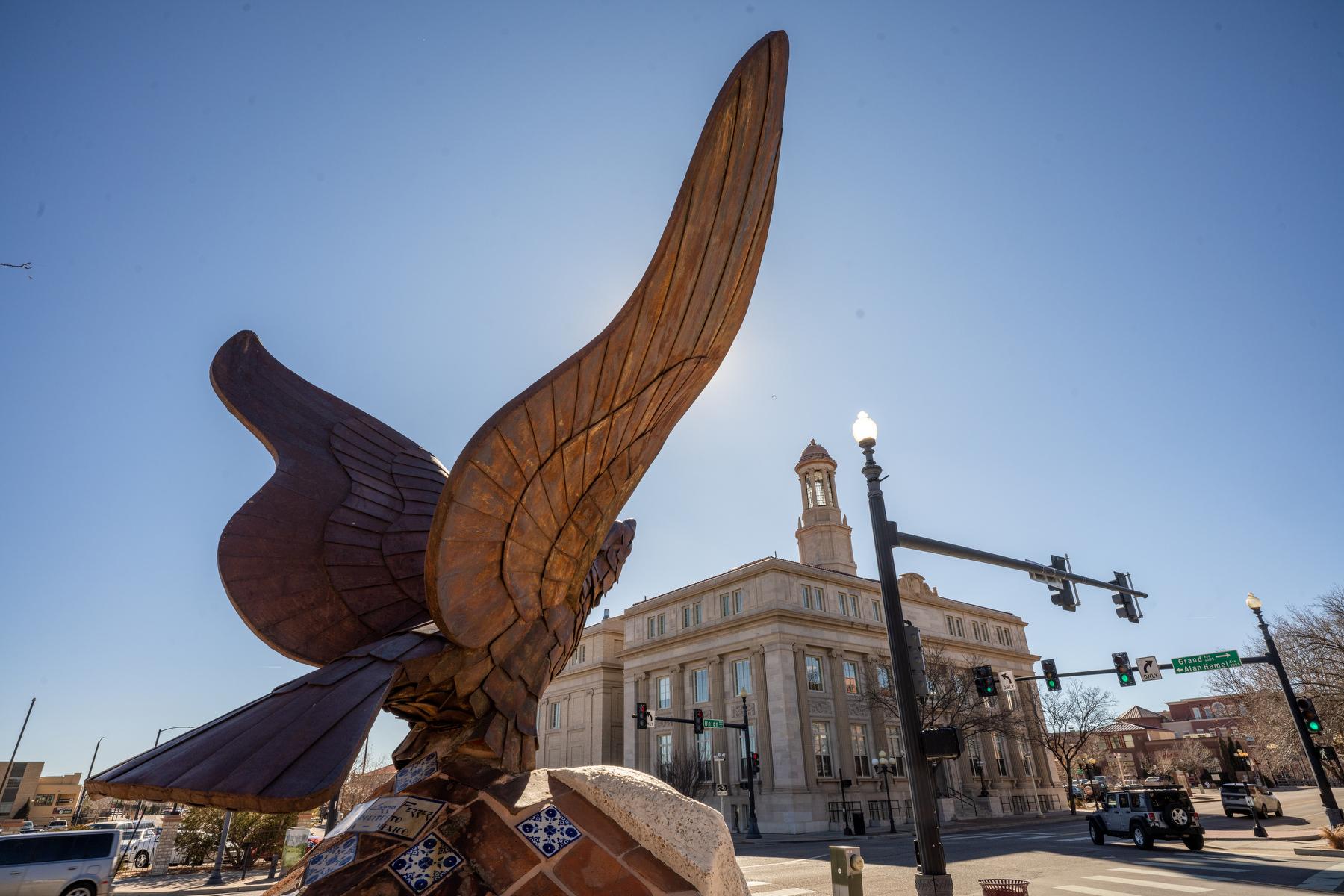
Updated 3:25 p.m. with transcript -- Colorado would dump political party caucuses in favor of a presidential primary if a measure passes on this year's ballot.
Proposition 107 would also open that primary to unaffiliated voters. That means they'd be able to pick a presidential candidate for the general election even though they don't belong to a party. This bestows new power on more than a million Coloradans. There's a companion measure, Proposition 108, that opens down-ballot primaries to unaffiliated voters as well.
Colorado Matters host Ryan Warner spoke with Curtis Hubbard, spokesman for Let Colorado Vote. And, from the opposition, former Republican state Sen. Ted Harvey, of Highlands Ranch. Click on the audio link above to hear the full conversation, and read an edited transcript below.
Read the transcript:
Ryan Warner: This is Colorado Matters from CPR News. I'm Ryan Warner. Colorado would dump presidential caucuses in favor of primaries if a measure passes on this year's ballot. Prop 107 would also open those primaries to unaffiliated voters, meaning they'd be able to pick a presidential candidate even though they don't belong to a party. This would bestow new power on more than a million Coloradans. There's a companion measure on the ballot that we'll debate today as well with spokesman for Let Colorado Vote, these are the supporters, Curtis Hubbard. And for the opposition, former Republican state Senator, Ted Harvey of Highlands Ranch. Gentlemen, welcome to the program. Senator Ted Harvey: Thanks for having us. Curtis Hubbard: Good morning. Thanks for having us. RW: Colorado had presidential primaries before in 1992, 1996 and 2000. Scrapped them in favor of caucuses. Curtis, why should Colorado go back to this? CH: Well I think one of the critical differences is that in those primaries, unaffiliated voters weren't participating. So that's number one. Number two, all you have to do is think back to March 1st of this year. If you were a Democrat, you were greeted at your caucus by lines out the door, long waits, disorganization. If you were a Republican, you did not have any sort of a presidential preference poll and if you were one of the one million unaffiliated voters in Colorado, you were locked out all together. When you add it all up, just five percent, that's one in twenty active voters in Colorado participated in the nominating process for the highest office in the land. We think that participation is a better outcome and that if Colorado is participating early in the process, we'll have great influence on the national discussion. RW: Prop 107 brings back presidential primaries as we said, opens them up to independents. This other proposition, 108, opens down–ballot primaries to unaffiliated voters. Practically, how would an unaffiliated voter participate in a primary? And the primaries would be mail–in, right? CH: Correct. So they would be treated the same way that Republicans and Democrats currently are treated which means they would be mailed a ballot. That ballot would have, under our measure, both parties' candidates listed and simple instructions to vote in one but not both party's primaries, doing so could invalidate your vote. They would then pick one party's primary to participate in, return their ballot just like any other voter and have their say in Colorado's primary elections, which oftentimes are the elections where it really matters. Whether it's Senator Harvey's district or a district like where I live in Boulder, that's when you're really deciding on who's going to serve the citizens of that district. RW: Right. So to be clear, between the two propositions, you're not talking just about the presidential election but down–ballot races as well. And so these unaffiliated voters would be delivered a ballot that had candidates from both parties. Potential for some confusion there? Wouldn't the ballot be invalidated if you vote for both parties accident––well I don't know about accidentally, but sort of unwittingly? CH: Yeah, it could be. We think Colorado voters are extremely smart. Already we ask them to use a blue or black pen; we ask them to fill in a box; we ask them to sign the back of an envelope to return the ballot to a privacy sleeve; to return it by 7 p.m. on a Tuesday. So we think when we ask them all of that, that they're also smart enough to be able to read that they can vote in one party's primary but not both. And a critical thing here, Ryan, is Colorado leads the nation in growth of unaffiliated voters. More than a million Colorado voters, more than 50 percent of voters under age 40. It's critical that we get them involved in our election process so that we have candidates who are more responsive to the views of the Colorado electorate. RW: Senator Harvey, I want to understand the nature of your opposition. Is it to primaries? Is it to the fact that these would be primaries open to unaffiliated voters? TH: Predominantly that it's open to unaffiliated voters. These are private entities, these political parties that are choosing their nominees, they're private entities and we are saying that people who are not a part of this private entity should be allowed to choose the leaders of these parties. It's like saying the Mormon Church will get to choose who is going to be the Pope or allowing Bill Belichick to decide who's going to be the quarterback for the Denver Broncos. RW: A religious and a sports metaphor. Okay. TH: And I just fundamentally believe that that's inappropriate. The Republican Party is the Republican Party, they should be able to decide who is going to be their leader and the same with the Democrat Party. I'm not opposed to a primary. I actually supported the effort that was going before the legislature last year to have a presidential primary because I believe, like Curtis said, that we want to have Colorado play a more important role in the primary process. And right now, with the way we do the caucus system for choosing our candidate, who we're going to support from Colorado, it sometimes is tough to do. If you look at the preference polls that we did at our caucuses over the last several years, when we had Romney win one time and by the time we got to the convention, actually the very next day, he dropped out of the race and you saw the same with other races where the person who won the straw poll at the Republican caucuses wasn't in the race. RW: I think it was Santorum at one point. TH: Santorum as well. RW: But let's go back to the sort of nugget of your opposition here which is that you don’t think unaffiliated voters ought to participate in what is a private function in your estimation and I suppose you would say what to an unaffiliated voter who wants to participate? It's not that they don't have any means… TH: Register with one of the parties. RW: Register. TH: Currently the way the process is, if an unaffiliated wants to participate in one of the party caucuses, or primaries, they can affiliate at the day of the election. What this is saying is we are going to require the counties and the state to pay for ballots going to all unaffiliated voters with a ballot for each party and then at that time the unaffiliated voter, if they want to participate, can participate in the primary. And most likely most unaffiliated voters, history has shown, that most unaffiliated voters don’t even want to participate in the primary ballot election but we are going to ask the taxpayer to fund the costs of sending that ballot to every single unaffiliated voter, whether they want to vote or not. RW: Is that true? What do you base that on, the idea that a lot of unaffiliated voters don’t want to participate? TH: Because they haven't. They haven't changed their [unclear]. RW: Well haven't been able to under the current system. TH: Sure they can, they can change their party registration and then immediately go back. There's no history, there's no evidence to the fact that you have a huge mass of unaffiliated voters switching to their party registration right before the election. RW: Curtis, lots of point to have you address here. First of all, what do you understand the desire to be among unaffiliated voters? CH: So the desire among unaffiliated voters is to participate. Colorado has among –– TH: How do you know that? CH: ––the highest participation in general elections in the country. RW: And if they want to participate, why don't more of them register? CH: Because you're asking them to be something that they're not. You're asking them to declare to be something that they're not and fundamentally, Senator, what this is about is this is a taxpayer financed election. And our view is if you're asking taxpayers to finance your private party function, then they should have a say in that process without being asked to join a party that they don’t believe that they're a part of but that they should have a say. CH: Absolutely. And Proposition 108 gives the parties an opportunity to opt–out if they choose to continue to keep a million unaffiliated voters from participating in elections that they pay for, they can instead nominate their candidates through a private process. And I think what's important here is we haven't been treating unaffiliated voters in Colorado the same way we've been treating Democrats and Republicans. They're not mailed primary ballots, they're forced to take additional steps that other voters are not required to take in order to participate. And fundamentally we believe that all voters should be given the opportunity to participate in taxpayer financed elections. RW: But if unaffiliated voters, Curtis Hubbard, don't feel a simpatico with a particular party, okay, wouldn't it be possible that they get that ballot and their goal is to choose the weakest candidate in a party that they oppose. So let's be clear. Unaffiliated voter doesn't mean one who doesn't have partisan feelings, they may lean left or right, if they want to kind of meddle–– CH: So we've studied this issue very closely, Ryan, and it's important to note that primaries that are open to unaffiliated voters take place in the majority of states. So Colorado is in the minority in closing its elections to unaffiliated voters and there's just no data to support that argument. It's something that people throw out there as a red herring that oh, this is a possibility. But people take the right to participate, the right to vote very seriously. And our view is that this is a critical phase of the election process and right now it's closed to the largest group of voters in the state. We believe by opening it to those voters that we'll have better candidates and better outcomes. RW: So you think that sabotage argument is a red herring? CH: Correct. RW: And what do you think, Ted Harvey? TH: We are not denying unaffiliated voters the ability to vote. They can register to vote in either party that they want to, right now, on election day. That is not denying unaffiliated voters the ability to vote. What we are saying is these are private entities and these private entities should have the ability to choose their leaders without having undue influence from other people that aren't part of that organization. That makes sense to me and why would we have the taxpayers pay for that. Curtis just said that the taxpayers are already paying for it. Well the taxpayers aren't paying for a caucus. The caucus is already choosing the candidates in many of these situations. CH: And we've seen the result of that type of system. TH: I'm sorry, I didn't interrupt, you went on for a good five minutes and I didn't interrupt you at all. And why would we want to have taxpayer dollars sending ballots to hundreds of thousands of people that don't want to participate in the process. If they wanted to participate in the process, they would right now and we are now asking the taxpayers through this initiative to get, to pay for ballots going to people who don’t want to participate. It seems like an expense that the taxpayers shouldn't have to fund. RW: Isn't, Senator Harvey, isn't the assumption with voting that expanding the franchise is in the best interest. In other words, to say, to send a bunch of ballots to people who don't want them, don’t you want to assume that people are interested in voting? TH: If they were interested in voting, they would vote. They would register, on the same day, you can go and register to vote today. If they were so interested in doing it, they would do it. RW: And to the point that we heard from Curtis Hubbard, which is that's a violation of their identity, of how they see themselves as a voter? TH: Well that's fine. It's a violation of my identity that I'm a Republican choosing my leaders and I'm having people that aren't a part of my identity choosing who the leader would be. That's fundamental to the democratic process in the United States that people that are members of certain parties have the ability to choose their leadership. RW: We are debating Props 107, 108 in Colorado on this year's ballot. You're listening to Colorado Matters and these measures have to do with how people vote and who can vote, largely in primaries in Colorado. I want to say that the backers of Let Colorado Vote, that's the group that supports this, there's a lot of businesses. DaVita Healthcare for instance, that's the dialysis company, they've given around half a million dollars. Attorney Frank Azar, First National Bank. Curtis, why are businesses giving chunks of change here? CH: Because they understand what's important for the health of our democracy and that's having people involved in the process. They've seen too many issues in recent years where there's widespread agreement on how Colorado can solve a problem or that Colorado must address an issue, whether that's construction defect reform, whether that's the hospital provider fee moving it into an enterprise. And this is a system that will reward lawmakers for pursuing solutions as opposed to what we often hear in this community is a lawmaker saying gee, I'd love to support you but I might get primaried. Rather than worrying about all of the most extreme partisans on the right or the left, they're worried about the larger electorate. And I wanted to address one–– RW: So you think this would have an effect of moving the politics of Colorado to the center? CH: It would certainly make them responsive to more voters. And our view is that when you're making elected officials responsible to a larger share of the electorate, you're going to get better outcomes. And think about the participation in our current processes. Just one in twenty voters participated in the caucuses. Just one in five voters participates in the primaries. So the Senator says that this is about if you want to participate, you do, well under his logic, because only one in five partisans participates in the primary, we should just form a committee, let them, it'll be a representative sample, and we could just let them make the decisions on who we elect. I think, and I think the majority of Coloradans think, that we should involve people in the electoral process. Colorado has made decisions to mail ballots to all voters. They've made decisions to open polling places two weeks before elections and we think they should make the decision to involve unaffiliated voters in these two critical phases of the process. RW: Senator Harvey, address this idea that this might have a centering effect in some regards in politics. TH: Well I don’t think there's any evidence of that. Again you're going to have people that are getting ballots that don't want to participate in the primary process to begin with. And we are–– RW: But won't you be getting some people who want to? TH: And we are a representative––they can now. They can go and they can change their voter registration on day one. We have same day voter registration and they're not taking advantage of it and changing over en masse. We are a representative form of government. We have people that are getting elected from the people that are participating in the process, going to the caucuses, going to their primaries and representing the people that elected them. Simply because people don't participate in the process of choosing those candidates does not mean that the taxpayers of the state of Colorado should send ballots to all of those hundreds of thousands of people that don't want to participate in the process. RW: Let's talk about expense because this is an interesting point. Right now under the caucus system for presidential selection, the parties absorb that cost. What you've been saying, Senator Harvey, is that the state and counties absorb the cost of a mail–in primary and you don’t think that's right in this case, given that unaffiliated voters can vote. TH: Well I think that if we go to a presidential primary and that we are sending ballots to Republicans for the Republican primary, Democrats for the Democrat primary, that expense is not nearly as expensive as doing an open primary where we're sending ballots with, to all unaffiliated voters. But then you also have to realize that you're sending not only presidential ballots on one ballot, on one of the initiatives we have–– RW: Proposition 107. TH: And on the other initiative you're sending ballots to unaffiliateds with multiple candidates on there. You will have the US Senate candidates, you'll have congressional candidates, you'll have state legislative candidates and I believe you will have a huge number of spoiled ballots and you will have people getting ballots that don't want to vote in those primaries. So between the confusion, between the expense, why are we doing, what's the upside to it? I think the upside, the cost is, far exceeds the upside of doing it. RW: But again you would support the notion of a primary, just one not open to unaffiliated voters. TH: For the presidential primary. Not for all of the other races that are out there because the only justification for doing it for the presidential primary is to make Colorado more relevant in the national election of the president of the United States. RW: Curtis, briefly, is this worth the expense? CH: Absolutely. And we think when voters approve these measures in November they will have spoken loud and clear that they value participation; that they want to vote; that they want to see people participating in our process without having to declare to be something that they're not. That they think that there's a better way than a caucus system that is only participated in by five percent of active voters in the state and that we involve the largest segment of the population of the electorate in elections that they pay for. RW: Curtis Hubbard, spokesman for Let Colorado Vote, which is behind Props 107 and 108 on this year's ballot. They would create open primaries here. Former state Senator Ted Harvey, a Republican from Highlands Ranch, opposes those measures. We've also debated a ballot measure to raise the state's minimum wage. You can hear that at cprnews.org and tomorrow, the debate to allow for medically assisted death in Colorado. This is Colorado Matters from CPR News. |
Editors note: As a point of clarification to this debate, on the day of a primary election in down-ballot races in Colorado, voters can change their registration from unaffiliated to participate. However, to take part in a presidential caucus, voters must be registered with a political party two months prior, according to the Secretary of State's office.








